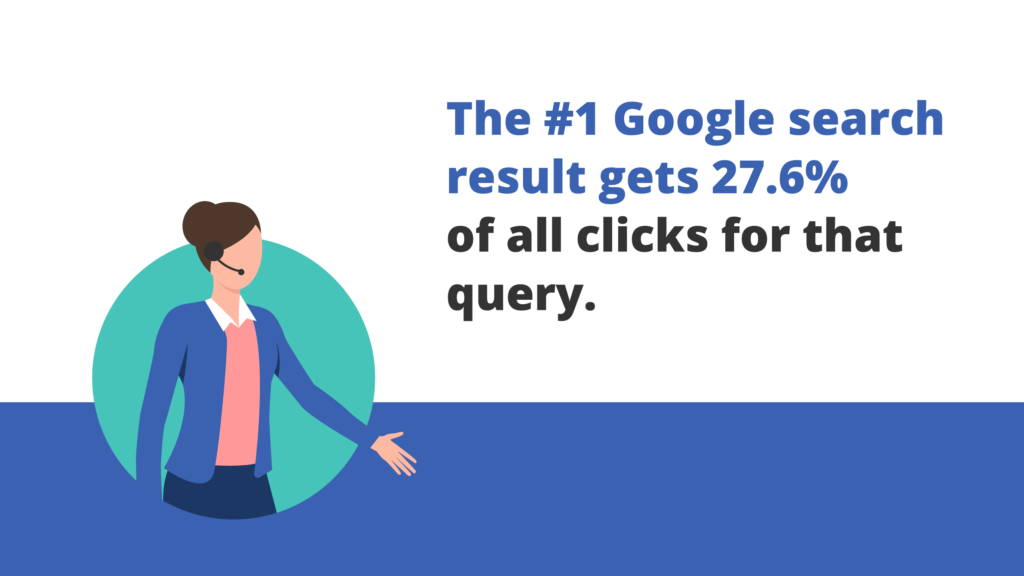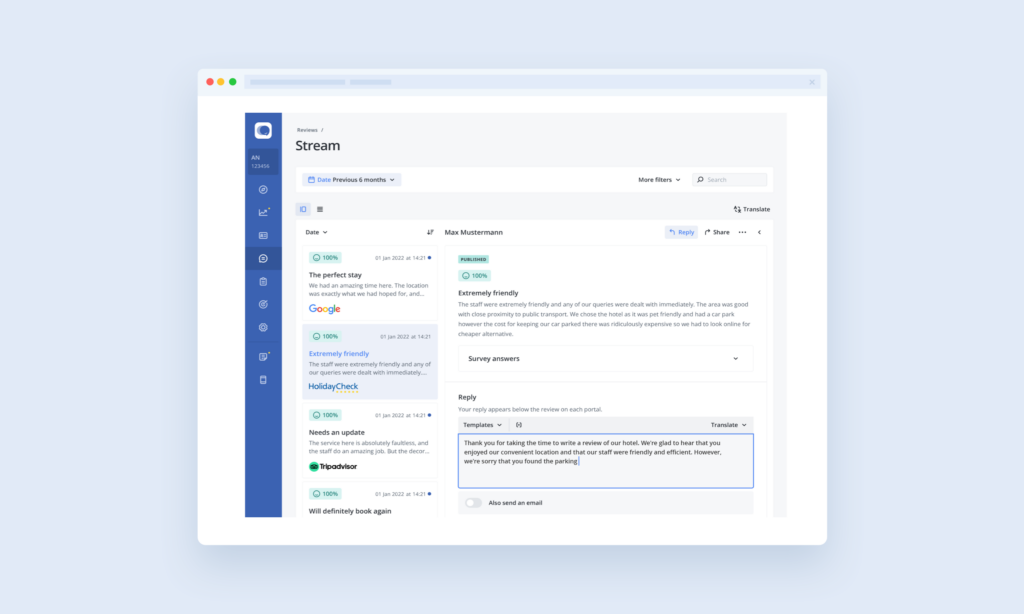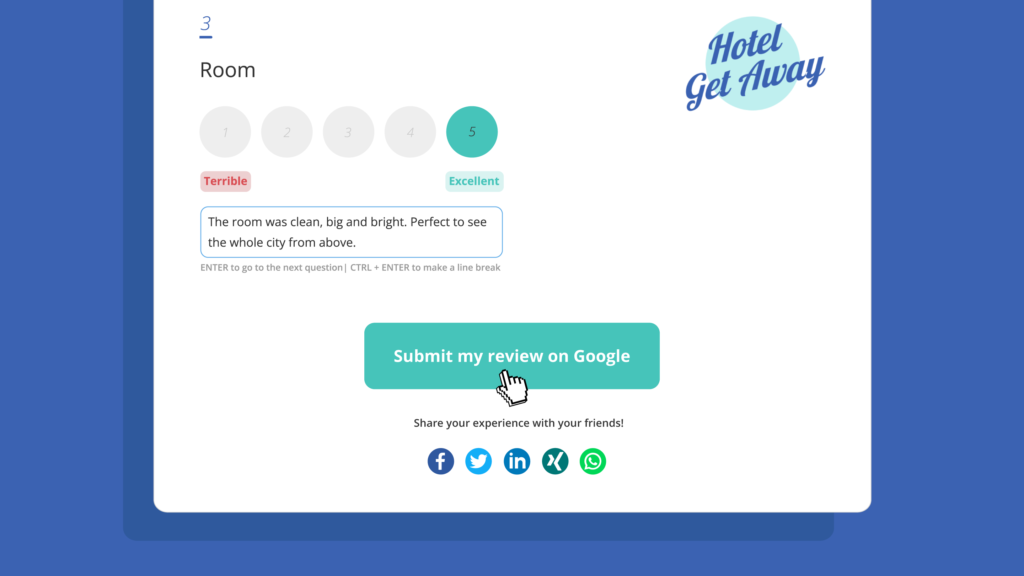If there’s one company that everyone knows, it’s Google. The most popular search engine in the world, it accounts for an enormous 92% of the market share (1). It’s clear that showing up on the first page of Google search results can be huge for your business. Yet many companies are unsure how to reach that coveted top spot. In this article, we’re going to explore how reviews can boost your SEO, get more clicks on your website and ultimately improve your revenue.
What is SEO?
Let’s start with the basics. Search Engine Optimization, usually shortened to SEO, is a set of practices designed to improve the positioning of your website in search engine results. In other words, the better your SEO, the easier it is for people to find you online.
The gold standard of SEO is for your website to appear in the top three results on Google when people search for terms related to your business. For example, if you own a hotel in Paris, then you want to be showing up near the top when people Google things like ‘hotels in Paris, ‘best hotels in Paris’ or ‘where to stay in Paris’.
Why top three? While being on the first page of results is a great place to be, research has shown that the top three search results get the highest number of clicks (with the top spot getting 27.6% of them!) (2). The further down you go, the fewer clicks you get, with very few users visiting the second page and beyond.

Reviews And SEO: Why Google Loves Reviews
Now we know all about SEO. But what exactly does it have to do with reviews? We asked Marco Schlauri, SEO expert and Managing Director at Digital Leverage, to share the different ways reviews can get you higher rankings on Google results.
Reviews Help Google Understand Your Business
The more content there is about your company, whether it be from your own website or from others, the more complete a picture Google has of what you are all about.
Every review you receive is fresh content. In those reviews, customers describe your product or service. Search engines scan this new content to find more and more relevant keywords about your business. This helps them to provide better results for users and helps you get found online. You can double down on this benefit by using keyword-rich reviews on your site. As Marco explains:
“You can easily use customer reviews to add highly relevant content to your website or blog. Every so often, your customers will directly mention your product category e.g. “my favourite hotel in Berlin“. This is gold for web pages as it allows you to add keywords in a very natural way. If not, feel free to reach out and ask if you can amend the review. I’ve learned that most happy customers are open to my suggestions. However, please refrain from overdoing this, or it becomes spammy.”
Pro tip 💡 Having relevant keywords in your online reviews will impact how you get found online when Google’s SGE (Search Generative Experience) is introduced. Read more here: “How customer reviews will drive rankings in Google’s Search Generative Experience”.
Google Trusts Your Customers
Of course, everyone wants to present their business online in the best possible way. But customers aren’t afraid to give their honest opinion about your service or your product.
That’s why when a customer leaves a good review, Google sees it as an endorsement of your company and a show of trust in your brand. Because Google wants to show its users the best, most relevant results for their query, they reward well-reviewed businesses with greater visibility. And it’s not just search engines that trust reviews, it’s other potential customers too. As Marco says:
“Customers might comment on a specific feature of your business or problem you’ve helped them overcome. So really, customer reviews can be used in your content along the whole customer journey. From unaware to problem aware, solution aware to product aware. They present a great opportunity to not only attract but also engage and convert customers.”
Good Click Through Rates = Better Rankings
All business owners know that people trust online reviews. Naturally, this means potential customers are more likely to click on a business that has four or five stars over a business that has a low star rating.
In some cases, those with mostly bad reviews may not even be seen! One study showed that 70% of people use rating filters when searching for businesses (3). The most common filter was for companies with 4-star ratings and higher. So chances are that if you are well-reviewed, you will be getting a much higher click-through rate than those with poor or very few reviews.
If you are getting a lot of clicks, that is one of the best ways to signal to Google that you are doing something right. In other words, it shows them that your website is worth seeing by their users and can result in a higher position in search results.
The reasons above are why it’s so important to consistently generate new reviews for your business. With so many new things being published online every day, Google is constantly searching for new information to update its search results. New reviews give Google current data to work with, making sure that you don’t get left behind when it comes to attracting organic traffic.
What Factors Help You Rank Higher?
Understanding the intricate details of SEO optimisation can be tough. While Google doesn’t explicitly state what they’re looking for from reviews, it’s clear that the nature, volume, and authenticity of these reviews significantly influence your website’s ranking on search results. This section will delve deeper into the key factors that can help your site rank higher.
High Rankings
High rankings on Google reviews signal to both potential customers and the search engine itself that your business provides a quality service or product. These high rankings not only influence customer decision-making but also play a crucial role in search engine optimization.
Google uses these reviews as an indicator of your business’s trustworthiness and credibility. If your business consistently receives high ratings, Google is more likely to rank your website higher on its search results, associating your brand with high quality and positive customer experience.
Review Quantity
The sheer number of reviews can also substantially impact your SEO performance. Businesses with a higher volume of reviews typically have an advantage in search engine rankings. The rationale behind this is simple – the more reviews you have, the more data Google has to understand the quality and relevance of your business to users’ search queries.
This concept extends to all review portals. As Marco explains:
“Reviews that are published externally can also strengthen your brand authority. Ideally, you’ll receive direct backlinks from websites, blogs or review aggregation websites. However, even if not linked directly, Google might effectively take brand mentions into consideration when ranking your website. (That’s a topic that’s still highly debated in the SEO industry, though).”
However, keep in mind that this doesn’t mean you should aim for mass reviews mindlessly. Quality matters alongside quantity, and it’s crucial to strive for genuine, meaningful reviews from your customers.
Reviews With Text
While star ratings hold their significance, reviews that include text (as opposed to just a rating) can be even more influential for your SEO strategy. Textual reviews allow Google’s algorithms to gain deeper insights into what your business offers and how customers perceive it.
The presence of relevant keywords within these reviews can also help Google better understand your business and subsequently improve your website’s visibility for those terms. Furthermore, text reviews provide potential customers with more context about your products or services, thus aiding in their decision-making process.
To encourage customers to write something alongside their rating, try asking questions in your invitation to leave a review. For example, if your hotel is within walking distance to a popular tourist attraction, you could say:
“Here are some questions that might help guide your review:
- How did you find the comfort and amenities of your room?
- Were our staff able to assist you efficiently?
- How convenient was the location of our hotel in relation to [Tourist Attraction]?
- What was the highlight of your stay with us?”
This gives customers some helpful prompts if they’re not sure what to write, while also nudging them to include keywords relevant to your business.
Consistent Reviews
Consistency in receiving reviews over time can significantly boost your website’s SEO performance. Google values recent reviews more, indicating that your business is active and consistently generating engagement. Hence, a steady stream of recent, high-quality reviews can demonstrate to Google that your business remains relevant and valuable to its customers.
Replying To Reviews
Engaging with your reviews by replying to them not only demonstrates excellent customer service, but it also plays a role in optimizing your website’s SEO. Google takes note of businesses that frequently interact with their customers via reviews, stating Regular responses indicate an active, engaged, and customer-focused business.
When replying to positive reviews, a simple acknowledgement and expression of gratitude can go a long way in fostering goodwill and encouraging further positive feedback. For negative reviews, a thoughtful, professional response can turn a potentially damaging situation into an opportunity to showcase your business’s commitment to customer satisfaction.

Moreover, replying to reviews gives you a chance to naturally incorporate relevant keywords into your responses. Just as in the case of reviews with text, these responses can further help Google’s algorithms to understand your business better.
Remember, the goal isn’t to just increase the volume of responses, but to create meaningful engagement with your customers. Genuine responses that address customers’ praises, concerns, or criticisms can significantly enhance your online reputation and, in turn, your SEO performance.
Reviews And SEO: The Power Of Local Search Results
When we talk about search results, don’t forget that we aren’t just talking about the list of sites on the page, but also which websites show up in the Google Map Pack. You may not have heard the name before, but you’ll definitely have seen it. This is the section of Google that showcases the top-ranking local listings for your location (or the search location) alongside a map.
Businesses with a higher star rating tend to see up to a 35% higher click-through rate within these results (4). It’s worth noting that data from the map pack is also shared directly with Google Maps. That means when people are searching for directions to local businesses, yours is all the more likely to show up. To help you get the best results from this strategy, there are a few other things you need to do:
- Make sure that all your Google Business Profile information is correct and up-to-date
- Double-check that your business name, address and phone number are consistent in your Google Business Profile and elsewhere online (including not just your own website but also social media and any other third-party site or review site where you’re listed)
- Respond to all your reviews, both positive and negative
Commit to your new review strategy and it won’t be long before you see the impact on your local SEO rankings.
So, How Do I Actually Get More Reviews For My Business?
The number one mistake businesses make when it comes to getting reviews is to simply sit back and wait for it to happen. While this approach may get you a few reviews once in a blue moon, taking a proactive stance is so much more effective at upping your review quantity both quickly and consistently.
An invitation to leave a review (usually via email) allows you to reach every single customer with almost no manual work. You may be surprised at just how many people are willing to leave customer feedback when you ask them directly. No, not everyone will make the effort, but keep a few best practices in mind and your average rating will go up in no time.
Ask Sooner Rather Than Later
It’s best to ask for a review shortly after someone has finished their interaction with your company (whether that be making a purchase, checking out of a hotel or leaving their appointment). The experience will still be fresh in their minds, and as a result, they’ll be more likely to want to share their thoughts. Leave it too long, and they’ll be unsure of what to say and unlikely to complete a review.
Make It Simple
People have hectic schedules, so make it too difficult to leave a review and they will simply give up trying. Ideally, you want your customers to be able to click a single link and be taken to where they can leave their feedback.

This is also what makes email invitations so effective. Rather than asking for a review in person (only for them to forget by the time they’ve arrived home), email shows up where your customers are going to see it (how many times have you checked your inbox today?) By appearing right in front of them and providing a low-effort interaction, you are reducing friction for your customer, making them far more likely to complete the task.
Pro tip: Not sure how to direct customers directly to leave a Google review? Good news! Google has recently made this much easier to do. On your computer, sign in to your Google My Business account, click ‘Home’ on the left menu, and click the ‘Get More Reviews’ card. A window will pop up with a short version of your listing’s URL. Click the link and it will automatically be copied to your clipboard for you to share however you like.
Don’t Incentivize!
You may be tempted to offer something to your customers in exchange for a review, for example, entry into a prize draw or a discount code. However, this is against Google’s terms and conditions and is a good way to be penalised in search results. An automatic review request, as we outlined above, is more than enough to generate results. And remember, both positive reviews and negative reviews can work in your favour (as long as you respond appropriately), so don’t worry too much about only asking happy customers.
Take Advantage Of Automation
While it’s always a good idea to put a review strategy in place, there’s no question that manually sending review invitations can take a lot of time and effort. Even with the best will in the world, there will be times when you cannot keep up. That’s why finding an online review management solution is a great way to ensure positive results from the start. Save the hassle and manual work, and use automation to your advantage.
Conclusion: Reviews and SEO
Reviews are just one part of a successful SEO strategy. But the bottom line is that focussing on increasing your customer reviews can be hugely beneficial for your business. If you’d like to get your review collection on autopilot, Customer Alliance are here to help!
Our software enables you to automatically send review requests to help you quickly boost your quantity of reviews and boost your online visibility. With the option to distribute reviews to your industry’s most relevant platforms and a seamless review stream, Customer Alliance helps you save time and resources so you can get back to what you do best. Want to find out more? Book a personalised free demo and one of our experts will show you what we can do.
FAQs About Reviews And SE
How do reviews impact my website’s SEO?
Reviews are a crucial part of your website’s SEO strategy. They play a significant role in influencing your search engine ranking because Google uses them as a signal of your business’s credibility and relevance. High rankings, a large number of reviews, textual content in reviews, and consistent new reviews can all contribute to higher SEO rankings. Google also takes note of businesses that actively respond to reviews, viewing it as a sign of an engaged and customer-focused business.
How can I get more reviews to improve my SEO?
Encourage your customers to leave reviews after their purchase or interaction with your business. You could do this through follow-up emails, or even by simply asking them in person if the context allows. Offering an excellent customer experience can also naturally lead to more positive reviews. Remember to respond to these reviews regularly, as Google values active engagement.
Can negative reviews affect my SEO?
While negative reviews are never ideal, they don’t necessarily harm your SEO if you handle them properly. In fact, a mix of positive and negative reviews can make your business appear more authentic. Most importantly, how you respond to negative reviews matters. A professional and constructive response can turn a potentially damaging situation into a showcase of your business’s commitment to customer satisfaction, which can positively influence your SEO.
Does responding to reviews help me show up on the first page of Google?
While there’s no guarantee, responding to reviews is a positive signal to Google about your business’s engagement with customers and could contribute to improved visibility in search results. In addition, your responses provide additional content for Google to index, potentially enhancing your SEO performance. However, remember that SEO involves many factors, and a holistic approach is necessary to improve your chances of showing up on the first page of Google.
Sources
- Oberlo, ‘Search Engine Market Share In 2022’
- Backlinko, ‘We analyzed 4 million Google search results. Here’s what we learned about organic click-through rate’
- Reviewtrackers, ‘Online Reviews Statistics and Trends: A 2022 Report by ReviewTrackers’
- CXL, ‘Do Review Stars on Google Help Click-Through Rate? [Original Study]‘
Updated April 2024
